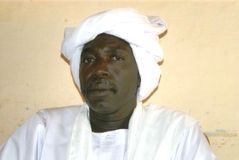Darfur’s Berti tribe distances its self from belligerent parties
Oct 17, 2006 (MADU, Sudan) — These are unhappy times for the king of the Berti tribe, with tens of thousands of his people killed, harassed or chased from their homes by fighting in Darfur.
 But as a surge of violence threatens those still clinging to their land, he’s careful not to point fingers at any warring faction.
But as a surge of violence threatens those still clinging to their land, he’s careful not to point fingers at any warring faction.
Tribal leaders whose people live amid one of the world’s worst humanitarian crises face a delicate balancing act: Even the perception of support for either government-allied Janjaweed militia or the rebel factions they battle may bring reprisal violence against their followers.
Despite the massive violence perpetrated against the Berti, King Sadeeg al Mellih Ahmadai insists his people were not being specifically targeted by either the government or rebels, but are just peaceful farmers and herdsmen caught in the maelstrom.
“The Berti are a peaceful people. When there is war, they prefer to take their belongings and leave,” he said in an interview in a police compound in the northern town of Mellit. “This is why you will find so many Berti in the refugee camps.”
More may be heading to camps soon, with a two-month-old government offensive causing violence to spike in northern Darfur, where about 250,000 Berti people are spread in villages across most of the arid region of Sudan’s remote west.
Ever since ethnic African rebels rose against the central government in 2003, the Sudanese government has been accused by many outsiders and many here of unleashing a fierce military repression — and of letting the Janjaweed militia of Arab nomads commit atrocities against African villagers, like the Berti. The United States says the targeted violence constitutes genocide.
More than 200,000 people have been killed in the ongoing fight and an estimated 2.5 million people have become refugees — many of them Berti villagers.
The latest fighting in the north of Darfur has left more than 350,000 people without any form of humanitarian aid, aid groups say. And at least 18,000 new villagers have fled to refugee camps on the outskirts of the regional capital of El Fasher.
In the vast no man’s land that constitutes the front line between the Sudanese army and various rebel groups, Berti villagers are less concerned about speaking out than their leaders. They say they are being regularly bombed by government aircraft.
“For us, the war is every day. It’s worse than ever,” said a leader in Madu village, Abubaker Jacob.
He said the village had been bombed twice the week before, killing three women and one donkey.
The Berti elders said rebels had held this territory for nearly two years, but had then split into factions over the summer and fought over the village.
In September, rebels withdrew to the mountains and government forces came into town. But the Sudanese army did not stay in Madu, the villagers said, and various armed groups continue to come in and out without notice.
Those remaining in the region are largely middle-income farmers — not wealthy enough to live in towns, but unwilling to give up their possessions. “We have our cattle, our land to cultivate. We can’t leave,” Jacob said.
The Berti king said he hopes a peace agreement signed in May between one rebel group and the government will soon quell the violence.
“The situation is already going better,” he said in the interview in Millet. “I think life will soon to turn back to normal.”
But people in Madu and many other villages said they fear a massive government offensive after the Muslim holy month of Ramadan finishes soon. “We expect things to become much worse,” Jacob said.
With his region roamed by fighting forces, and towns changing hands after deadly battles, Jacob says he’ll try and remain neutral — for the sake of staying out of the fight: “We just support whoever happens to be occupying our town that day.”
(AP)
